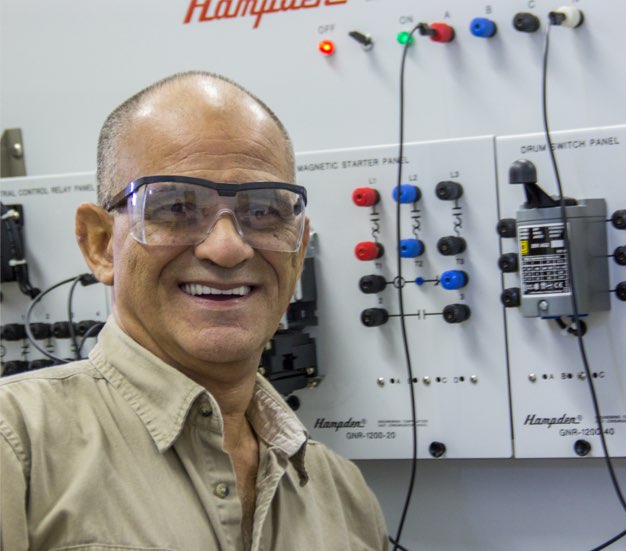
Instrumentation
The Instrumentation Program prepares students for Entry-Level careers in a high-skill, high-growth occupation.
Instructors bring field experience into the classroom to provide instruction and hands-on training. Classes meet two nights per week to accommodate work schedules.
The Instrumentation Program will follow the NCCER curriculum that is recognized by leading industry, construction, maintenance, and national associations. Students who successfully complete the courses will be listed in the NCCER registry that employers access for their recruitment efforts. Students completing this program will receive an Occupational Skills Award for Instrumentation I and II, NCCER and OSHA 10 Credentials.
Program Details
Learning Format
Face to Face
Program Length
48 weeks
Let’s Connect!
 409-933-8415
409-933-8415 ContEd@com.edu
ContEd@com.edu
Additional Program Info
Upon successfully completing all five courses in the Instrumentation program, students will earn a Certificate of Completion and become NCCER Certified. Students will gain knowledge from industry professionals and will be able to:
Understand Instrumentation Principles – Apply knowledge of pressure, temperature, flow, and level measurement in industrial settings.
Install and Calibrate Instruments – Properly set up, calibrate, and maintain sensors, transmitters, and controllers.
Interpret Technical Documents – Read and analyze P&ID (Piping and Instrumentation Diagrams), schematics, and manufacturer specifications.
Work with Programmable Logic Controllers (PLCs) – Program, troubleshoot, and maintain PLC-based control systems.
Apply Electrical and Electronic Fundamentals – Understand circuit design, wiring, and signal processing for instrumentation applications.
Troubleshoot Control Systems – Diagnose and repair faults in pneumatic, electronic, and digital instrumentation systems.
Follow Safety and Regulatory Standards – Adhere to OSHA, NEC, and industry safety protocols for handling hazardous environments.
Utilize Industry Tools and Equipment – Operate test and measurement devices, including multimeters, oscilloscopes, and pressure calibrators.
NCCER (National Center for Construction Education and Research) certification is a widely recognized credential in the construction industry that demonstrates an individual's skills, knowledge, and competency in various craft areas. NCCER aims to standardize training and provide industry-recognized credentials for workers in construction, maintenance, and pipeline industries. The NCCER certification process involves a comprehensive curriculum, with the NCCER Core Curriculum serving as a prerequisite for all other Level 1 craft curricula. Certification typically includes both Knowledge Verification, which involves written tests, and Performance Verification, which requires practical demonstrations of skills.
- Course name: NCCER Core Course Number: CNBT-1018
-
This course is a comprehensive study of NCCER Core for instrumentation students. This course introduces students to basic job site construction safety in residential, commercial and industrial construction. Students will also learn how to select and demonstrate the proper use of hand tools, portable and stationary power tools, and related construction equipment. Students will obtain their OSHA 10 certification and credentials for NCCER Core.
- Course name: Industrial Mathematics Course Number: TECM-1001
-
This course teaches math skills applicable to industrial occupations. It includes fractions and decimal manipulations, measurement, percentages and problem-solving techniques for equations and ratio/proportion applications.
- Course name: Instrumentation NCCER Level 1 Course Number: INTC-1007
-
This course is a comprehensive study of NCCER Level 1 for instrumentation. In this course, students will become familiar with the theory and application of instrumentation test equipment. The course emphasizes accuracy, limitations of instruments and calibration techniques. Students will select, set up and operate test and measurement tools and equipment; analyze measurement results; identify test instrument limitations and parameters; and demonstrate proper safety procedures. Upon completion, students will obtain credentials for NCCER Level 1.
- Course name: Instrumentation NCCER Level 2A Course Number: INTC-1043
-
This course is an introduction to automatic process control including measuring devices, analog and digital instrumentation, signal transmitters, recorders, alarms, controllers, control valves, and process and instrument diagrams. Topics include the connection and troubleshooting of loops. Students will learn to explain pneumatic and electronic controls; connect and troubleshoot control loops; and draw process and instrument diagrams, wiring diagrams, and block diagrams.
- Course name: Instrumentation NCCER Level 2B Course Number: INTC-1025
-
This course is a comprehensive study of NCCER Level 2-B for instrumentation. This course trains
students in the installation of instrumentation equipment into a process environment using
industry standards. Students will learn to outline the general procedures and mount an assigned
series of instrumentation devices. Upon completion, students will obtain credentials for NCCER
Level 2.
